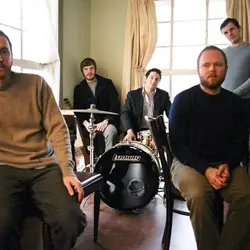 Midlake
MidlakeTime heals all wounds. It's been 18 or so months since co-founder of Texan outfit Midlake Tim Smith decided to part ways with the band. Having the primary songwriter leave a band often spells the end of a band, rebuilding from the ashes as a new project or imploding, their momentum irreparably halted. The band had almost completed recording their fourth album at that stage also – a posthumous release seemed likely, a haunting postscript of what was and what might have been. Instead the four remaining members – Eric Pulido, McKenzie Smith, Eric Nichelson and Paul Alexander – scrapped the material and forged ahead, bringing Joey McClellan (guitar) and Jesse Chandler (keys) into the fore and pushing Purdilo up to the mike. The result is Antiphon, an album that steps away from the pagan folk elements that infused earlier releases and takes on a more ephemeral trajectory, using the psychedelic touches of the past and adding new shades of colour. And while it may not be seen as the road to redemption for Pulido, he readily admits that it is a relief that Antiphon has kept Midlake moving confidently forward during such a tumultuous period. “There were a lot of things that needed to be defined at that time because although it was something we never desired, we had to figure out how we would move on,” Purdilo muses. “I won't lie; there were some growing pains in trying to rework everything, but there was an overt freedom that came along with it. As in life, when something like this happens it challenges you to drop any pretensions and step up and respond confidently in a way that is hopefully creative as well.”
Antiphon is the fruit of this reconfiguration, and it's a testament to the ability of the remaining members to roll back to the beginning of Midlake – some of the more rock-oriented structures are reminiscent of their 2004 debut Bamnan And Silvercork – while fully embracing the new members of the band and a different process of songwriting and composition. “We didn't have much time to overthink things so the fact there are similarities to other records is actually an inherent quality,” Pulido asserts. “The fact that there is a member missing now, and a very important one at that, doesn't mean that we will leave everything behind; when you are in a band and are friends for a long time you rub off on one another. So when you start something fresh it's still going to have some quality of what came before – you can't leave those personal elements behind entirely. We aren't trying to run from that but are embracing that; we aren't ashamed of our past. But now there are new inspirations and influences and a wider sense of freedom and scope to draw from.”
While the flights of pastoral fantasy aren't as forthcoming as they were in Smith's tenure, there is a sense that Midlake is flexing their muscles in a way that may have been constrained in the past. Tracks like Provider and It's Going Down seem the most glaring representation of Midlake's new sound, but there is the absence of voice altogether on the instrumental track Vale, which Purdilo admits that is poignant. “There was already a transition at play even before Tim left the band and it's easy to see in hindsight how he wasn't in love with touring anymore and wasn't satisfied with things. So I found myself singing along with him more and being positioned closer to the middle of the stage and talking to the crowd a lot to try and deflect some of the attention from him. I want to fill those gaps; as any band does you want things to work, you band together as a unit. So where Tim was at I felt I had to cover those gaps and it worked. But obviously when he left it was still a transition but it wasn't as drastic as it could have been. I'll never take away the impact Tim had on this band, but there was no time to cry over spilt milk. We just banded together and thought 'OK, how are we going to do this?' You can't get caught up in what is the ideal otherwise you become frozen on the spot; you won't go anywhere or do anything. We jumped right in and did what felt right, and I think that (Vale) is emblematic of that approach. We feel that every day, every show, is a little victory of sorts. All we wanted to do was to keep moving on and make a record, and we did that, and we desire to keep growing from there. It's a healthy environment and that can only be a good thing.”

















